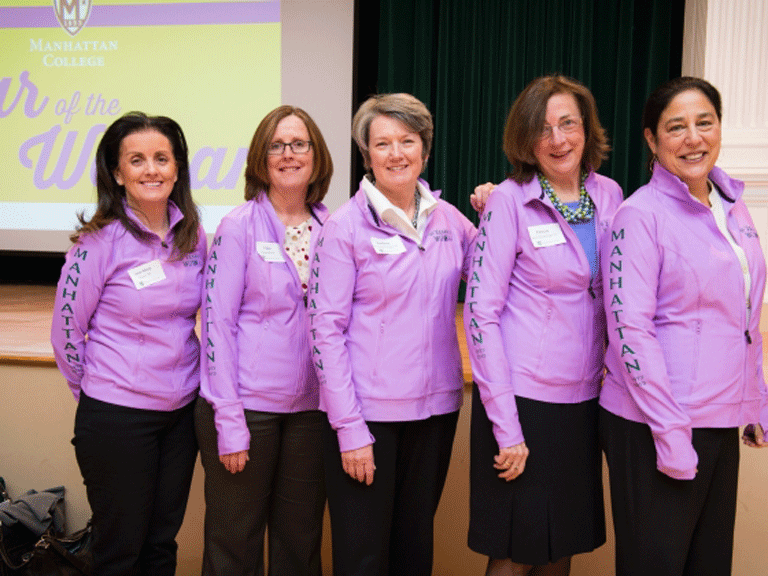 When Patricia Ruback-Kehrberger ’69 was admitted to Manhattan’s engineering program, it didn’t come in the form of a letter — rather a firm handshake — because until 40 years ago, women weren’t formally admitted at all.
When Patricia Ruback-Kehrberger ’69 was admitted to Manhattan’s engineering program, it didn’t come in the form of a letter — rather a firm handshake — because until 40 years ago, women weren’t formally admitted at all.
“Imagine the men who were here expecting that they were at a men’s school and all of the sudden they look and there, in their calculus class, is me,” Ruback-Kehrberger said on Nov. 20, of being the first woman engineering major at Manhattan College. During the special panel presentation celebrating 40 years of coeducation, she and other alumnae discussed how their trailblazing college years impacted their lives personally and professionally.
Annmarie Flynn ’81, Ph.D., moderated the panel, which included Ruback-Kehrberger, senior environmental engineer, CP Engineers & Architecture; Clare Cunniffe ’81, vice president, U.S. financial services, Informatica Corp.; Lisa Toscano ’79, Ed.D., associate professor of kinesiology, Manhattan College; and Kathleen McCarrick-Weiden ’79, Ph.D., vice president of taxation, Lefrak Organization.
The 1960s was a decade of change for women. At Manhattan, they got their foot in the door through a cooperative program with the College of Mount St. Vincent. By 1973, Manhattan was officially a coeducational institution, however, athletic and cocurricular programs were virtually nonexistent.
Class of ’79ers McCarrick-Weiden and Toscano discussed what it was like to pave the way for the first D-1 women’s basketball team at Manhattan, from preparing budgets and knocking on doors to calling local schools for games and fundraising. Both Toscano and McCarrick-Weiden reminisced about some humbling moments on the club team, from using a storage closet as a makeshift locker room to losing scrimmages to local high school teams. But their scrappy persistence paid off.
“The last game of the season we played Mt. St. Vincent, and we won,” Toscano said. “[When] we won you would have thought we won the Olympics. The men were all there to support us.”
Three years later, their basketball club team won first place in the Hudson Valley, which earned them varsity status their senior year. This tremendous achievement allowed the College to welcome Marianne Reilly ’82, Manhattan’s first women’s basketball recruit, who was also present at the event.
Not every opportunity was difficult for women to unlock at Manhattan. In the classroom, the doors were wide open.
“Manhattan served me well,” Cunniffe says, of her degree in marketing and computer information systems and its impact on her future career. She never would have considered taking computer classes in the School of Business if it hadn’t been for the Brothers’ encouragement.
“[Brother Anthony Flynn] believed in me, my abilities, [and] got me that student job in the computer lab,” Cunniffe continued. “All of the sudden I was doing [work with] computers where I never thought I had the aptitude and I actually liked it … I think what Manhattan taught me was to be open to anything, to keep showing up and to keep going forward and leading the pack.”
In addition to citing “the ability to lead” and “integrity” as among the most important takeaways of their Manhattan College educations, the panelists agreed that enduring friendship was among the most important.
“The close-knit community at Manhattan College isn’t for everybody,” said Toscano of students who are more drawn to big universities. “There were only a few women on campus, and you just hung onto them. They’re my friends. They’re here. I see them on holidays, at my job, and my teachers were wonderful; I had a great connection with them — it’s all the personal stuff.”
“What I took away was the definition of true friendship,” added Flynn, in agreement. “I think the faces change, but the heart is still here.”